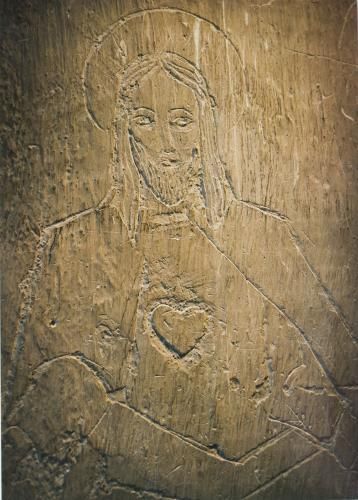Chapter Talk – Solemnity of the Sacred Heart – June 19, 2020
John, the ‘beloved disciple’ leaned on the chest of Christ. The ‘beloved disciple’ leaned on the “divine-human heart” (Wendy Wright, Sacred Heart Gateway to God, p.15). In John’s gospel we all are the ‘beloved disciple’. What are we ‘leaning’ upon when we lean on the heart of Christ? Sr. Kathy Huber, who gave us our retreat in 2010, in commenting on John, the beloved disciple, said he “rested his head on Jesus and heard the heartbeat of God”. She then describes John’s posture as one of “leaning and listening”. Leaning and listening, what a potent image for our prayer. Jesus’ heart is wide open in love, unconditional love…his wide-open love becomes the channel into God’s love.
I recently picked up a book titled New Wine Skins Reimagining Religious Life Today written by Sr. Sandra Schneiders in 1987. In her chapter on “Commitment: Light from the Fourth Gospel” she says that John, the evangelist, uses the “verb ‘to believe’ in the absolute, i.e., without an object twenty-five times” (p.78). What is the importance of this literary analysis that she emphasizes? She states: “‘To believe’ denotes a fundamental disposition of openness to the truth which makes the person capable of seeing the glory of God whenever and wherever it is revealed” (p.78). Why is this “fundamental openness of heart” so important, and so important for our religious commitment? This interior disposition she says is what enables us to be ‘taught by God’, “regardless of moral weakness and lapse, regardless of ethnic or religious background, regardless of orthodoxy, regardless of religious education or the lack thereof” (p.78-79). Dear sisters and brother, ‘to be taught by God’ means we are not in the driver’s seat. It means the state of our heart is humble, leaning on the Divine heart and listening.
The openness to truth begins with the truth of our selves. This we clearly learn from monastic life, where the immediate goal, Cassian tells us, is ‘purity of heart’. The truth of ourselves opens us to the larger horizon of the truth of God. Humility is the foundation for receiving the truth of myself…humility builds an inner strength where the noisy ego voice is no longer asserting itself non-stop and exerting such power over our lives! Inner strength rests on humility….it is always leaning and listening to the Divine whisperings, the whisperings of the Spirit speaking Christ’s word of life and love. Such an inner posture reveals the different motives or intentions of our hearts…Leaning and listening to the Divine heart invites us to ‘conversion’, to change our stubborn and selfish ways, to surrender this incessant, murmuring voice. Jesus gives us the parable of the Pharisee who in his prayer compares himself with the Publican. The Pharisee is so self-righteous about his outer behavior, while having no clue about what is happening in his own heart! And the Publican’s heart is wide-open seeking the mercy of God. Remember that St. Benedict refers to this story in the twelfth step of humility.
Wendy Wright in her book, Sacred Heart, Gateway to God states, “Jesus’ heart images our truest heart” (p.xiv). And so, we are drawn to His heart as we seek to find our own.
She speaks of Karl Rahner’s understanding of the Sacred Heart of Jesus. After Vatican II, Rahner believed that love of neighbor “would become a contemporary form of Sacred Heart devotion. The concrete love of others, which has both social and political implications, could sustain itself for love by entering into the attitudes and dispositions of the heart of Christ” (p.111). So here in these words I believe we have the essential dimension to this solemnity. ‘Leaning and listening’ into the heart of Christ shapes, recreates, transforms, instructs our hearts. The encounter of Christ’s heart with our heart: living into his attitudes and dispositions: this should cause us to pause in whatever conflict, no matter how small we are involved in with a sister or brother…Remembering to ‘lean and listen’….
Every year, for some time now, we put out this sketch of the Sacred Heart of Jesus. It was etched on the wall of prison cell #21, block II in Auschwitz. The sketch was drawn by a prisoner of war who used his fingernail to etch the image. The artist’s name is Stephan Jasienski, 2nd Lt. in the Polish Armed Forces. He died in the concentration camp at Auschwitz in 1944. What prevented Stephan’s heart from becoming hardened with bitterness? What prevented him from ‘hating’ his enemies? Clearly, his prayer, his goal, as he sat in his prison cell sketching this image with his fingernail, was to have his heart become like Christ’s heart. ‘Jesus’ heart images our truest heart’…perhaps Stephan found his heart through Christ’s heart. Perhaps his daily prayer was simply to lean on Christ’s heart and listen. Imagine, just imagine, the cry of his heart and soul as he embodied his prayer intention, to love even his ‘enemy’.
Every day we have the opportunity for change, for conversion. This daily conversion or change is not necessarily about ‘sin’. It simply begins with the awareness of the different impulses within our hearts…When we lean on Christ’s heart to listen, his heart of compassion calls us to listen to our heart…Keep in mind, that just this inner movement to lean on Christ’s heart, already changes the gestalt, that is, the interior dynamic or pattern of our hearts. Just sketching a little more Christ’s heart, just this symbolic movement affects our demeanor within and without. Our Church and world today are in desperate need of the ‘heart’ of Christ. As his disciples, let us pray to have our hearts become more like his…In this manner of living and being, we will be fulfilling our religious commitment.
Sr. Kathy DeVico, Abbess


